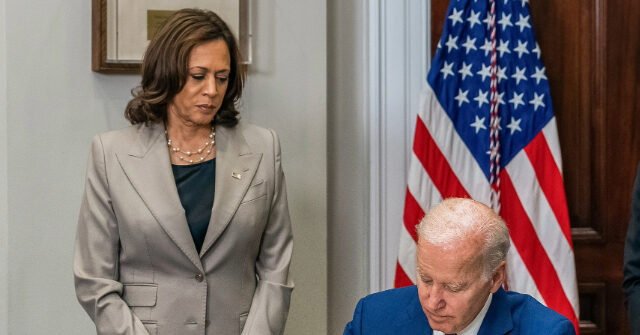Reps. Maria Elvira Salazar (R-FL), Mario Díaz-Balart (R-FL), and Carlos Giménez (R-FL) excoriated President Joe Biden on Monday for proposing radical changes to the Supreme Court, warning that late Venezuelan dictator Hugo Chávez made similar moves almost immediately after his election.
Chávez, a hardline socialist dictator, was elected to the presidency of Venezuela in 1999 and rapidly used his power to erode democratic institutions in the country. Upon his death in 2013, his successor Nicolás Maduro used state violence to silence dissent and eliminate the possibility of a free and fair election that could end the “Bolivarian Revolution.” Unlike Chávez, Maduro’s efforts were greatly strengthened by a Supreme Court dominated by socialist allies and dramatically empowered to silence the National Assembly, the federal legislature, and arrest or otherwise silence political opposition.
Maduro has held at least seven fraudulent elections since seizing power over a decade ago, the latest one taking place on Sunday. Maduro “ won” the election with 51.2 percent of the vote, according to the regime-controlled National Electoral Center (CNE), but has not published election data to back up this claim; opposition leaders allege they have evidence showing they defeated Maduro in a landslide.
The three South Florida lawmakers used the ongoing socialist crisis in Venezuela as a cautionary tale in response to President Biden’s publication of an essay in the Washington Post on Monday demanding dramatic constitutional changes to erode the independence of the Supreme Court. They published a video explaining their alarm at Biden’s proposals on Monday.
The 1st thing socialist dictator Nicolas Maduro did in #Venezuela was “reform”the country’s Supreme Court to undermine democracy & remain in power!
As Members of Congress, representing our community of exiles, we REJECT Biden’s call to “reform” the Supreme Court! pic.twitter.com/Zs4YWgpHEY
— Rep. Carlos A. Gimenez (@RepCarlos) July 29, 2024
“That is outrageous, and that goes against the system, the American exceptionality,” Rep. Salazar condemned.
“We had a great example of a threat to democracy yesterday when the Maduro regime invalidated an election and is trying to stay in power,” Rep. Giménez noted. “What’s the first thing that Hugo Chávez did when he became president 24 years ago? He actually reformed the Supreme Court of Venezuela.”
“What are they doing today? They are using that same court system to put in jail the main opposition leader, María Corina [Machado] and claim that she’s been conspiring with northern Macedonia,” he continued. “Touching the judicial system is one way to maintain power and so this is really, really dangerous for the national security, for our security and the security of democracy here in the United States.”
Machado, a former lawmaker who was violently expelled from office in 2014, was the frontrunner presidential candidate in the 2024 Venezuelan sham election. She won an opposition primary in October for the nomination, but Maduro used the Venezuelan supreme court, formally the Supreme Tribunal of Justice (STJ), to “ invalidate” the primary. Maduro also banned Machado from holding any public office for supporting U.S. human rights sanctions on the regime.
“We’ve seen this in history happen time and time again when somebody, for political reasons, tries to change the institutions,” Rep. Díaz-Balart said. “The Supreme Court, by the way, has been instrumental in maintaining the rule of law and democracy in this country.”
“It’s not the first time that the left talks about changing, reforming the Supreme Court, but it is highly dangerous, unacceptable – and that is a real threat to democracy.”
The lawmakers received the support from a fourth Cuban-American congressperson, Rep. Nicole Malliotakis (R-NY), who recalled on Monday, “Hugo Chavez packed the Supreme Court of Venezuela from 20 to 32 justices that repeatedly ruled in the corrupt government’s favor. It is how they destroyed the richest country in South America.”
Biden proposed three fundamental changes to the American Supreme Court on Monday, claiming that the Supreme Court’s current behavior is “not normal” and the Court is “in a breach” of its responsibilities. Biden is proposing eliminating immunity for presidents for acts committed while in office, overturning a recent Supreme Court ruling and decades of precedent; limiting justices to one 18-year term; and imposing an “ethics code” on the justices.
“Justices should be required to disclose gifts, refrain from public political activity and recuse themselves from cases in which they or their spouses have financial or other conflicts of interest,” Biden wrote.
Biden’s article did not clarify who would be responsible for writing the “ethics code” or why a Supreme Court should serve 18 years as a justice, not 20 or 15. The three proposals are flagrantly unconstitutional and would significantly expand the legislative and executive branches’ power over the Court, eroding the strength of the institution.
Fellow Democrats have supported Biden, claiming that the Supreme Court is “undermining our democracy” and that unconstitutional curtailing of court proceedings is a viable solution to this perceived problem.
Biden presented his radical proposal after dropping out of the 2024 presidential race amid concerns that he does not have the cognitive ability to perform the tasks of the office of the presidency. A poll by the firm Rasmussen Reports found this week that over half of Americans believe Biden should step down from the presidency before his term ends in January.
Venezuela’s STJ performs as an almost completely different entity today than how it functioned in 1999, the year Chávez was elected. The failed-coup-leader-turned- president waited until 2004, following a failed coup against him in 2002, to erode the power of the judicial body. That year, as Rep. Malliotakis noted, Chávez increased the number of STJ justices from 20 to 32 people, adding chavista loyalists to the bench.
“In addition to appointing the 12 new magistrates, five additional magistrates were appointed to fill some vacancies opened in recent months, and 32 more were appointed as alternate magistrates,” Human Rights Watch observed at the time.
Human Rights Watch continued:
Members and allies of Movement V Republic of President Chávez make up a majority in Congress. The law to cover the Supreme Court signed last May also gave the ruling coalition the power to remove magistrates from the Court without the qualified two-thirds majority required by the Constitution.
“The Venezuelan Congress dealt a severe blow to judicial independence in Venezuela by co-pairing the Supreme Court with 12 new magistrates,” Human Rights Watch fretted.
Chávez also faced condemnation from neighboring states and regional bodies such as the Interamerican Human Rights Commission (CIDH), but largely ignored it.
Under Maduro, the STJ took on a more prominent role in repression, effectively undermining the power of the National Assembly after the opposition, including both socialist and non-socialist elements, became the majority in the 2015 election. The 2015 legislative election is widely considered the last free and fair election in Venezuelan history.
The Supreme Court ruled shortly after the election that the National Assembly, the federal legislature, did not legally have lawmaking powers. In 2017, the Supreme Court moved to dissolve the National Assembly entirely, an unconstitutional move that Maduro enforced with the power of the military.
“Unfortunately, what we had warned has now come to pass,” Organization of American States (OAS) Secretary-General Luis Almagro said at the time. “The Secretary General of the OAS denounces the self-inflicted coup d’état perpetrated by the Venezuelan regime against the National Assembly, the last branch of government to be legitimized by the will of the people of Venezuela.”
In 2020, far-left former Chilean President Michelle Bachelet, in her capacity at the helm of the U.N. Office of the High Commissioner on Human Rights, published a report concluding, “The independence of the justice system has been considerably undermined by the insecurity in the custody of judges and prosecutors; the lack of transparency in the process of their appointment; precarious working conditions; and political interference.”








